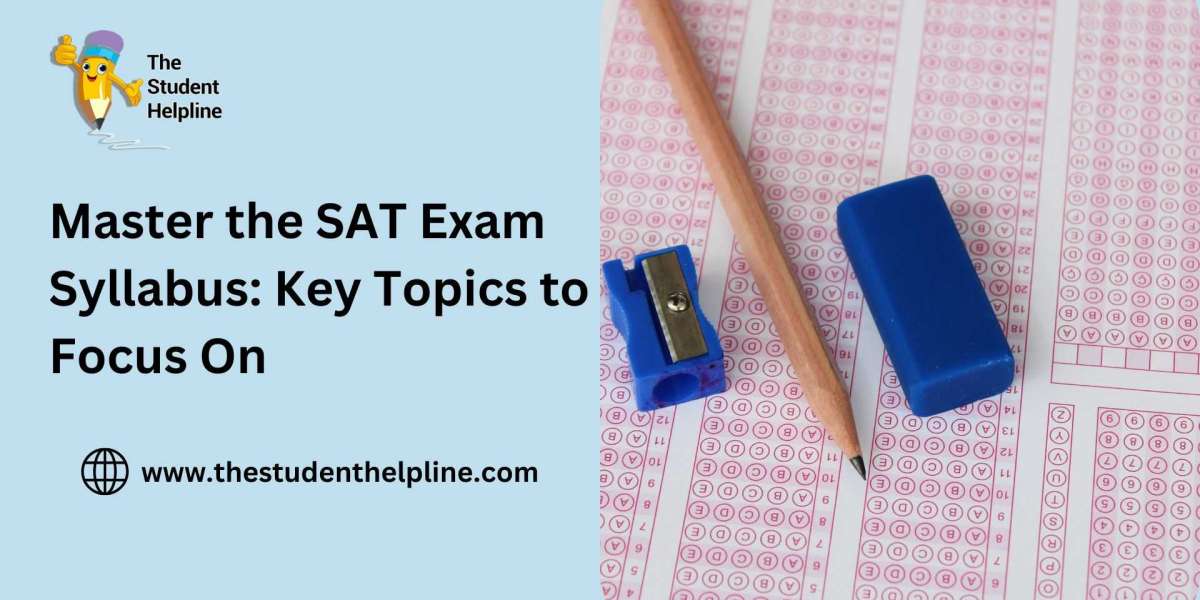The SAT exam is one of the most important standardized tests for students aspiring to attend colleges and universities in the United States. This exam tests critical reading, mathematics, and writing skills, making it essential for students to understand the SAT exam syllabus thoroughly. By familiarizing yourself with the structure and key topics of the SAT exam syllabus, you can create an effective study plan and increase your chances of achieving a high score.
In this post, we’ll explore the SAT exam syllabus in detail, breaking down the key topics you should focus on to maximize your performance. Whether you’re just starting to prepare or looking for ways to refine your approach, understanding these key areas will help you master the test.
Overview of the SAT Exam Syllabus
The SAT exam is divided into three main sections: Evidence-Based Reading and Writing (EBRW), Mathematics, and an optional Essay. The structure of the SAT exam syllabus is designed to evaluate a student’s ability to think critically and analytically. Below is a breakdown of each section.
1. Evidence-Based Reading and Writing (EBRW)
The Evidence-Based Reading and Writing section is divided into two main parts: the Reading Test and the Writing and Language Test.
Reading Test
The Reading Test assesses your ability to understand and analyze written texts. It includes passages from a variety of subjects, including literature, historical documents, social studies, and natural sciences.
Key Topics to Focus On:
- Contextual Meaning: Understand how words are used in context.
- Main Idea: Identify the main idea and supporting details of a passage.
- Inferences: Draw logical conclusions based on the information provided.
- Author’s Purpose and Tone: Determine the author's intent and tone.
- Evidence-Based Questions: Answer questions about specific evidence in the text.
Writing and Language Test
The Writing and Language Test evaluates your ability to revise and edit passages to improve clarity, consistency, and grammatical correctness. It involves identifying and correcting errors in grammar, usage, and punctuation.
Key Topics to Focus On:
- Grammar and Usage: Correct sentence structure, punctuation, subject-verb agreement, and sentence fragments.
- Rhetorical Skills: Understanding how the structure of a passage impacts its meaning and effectiveness.
- Style and Tone: Enhancing the tone and style of the text for clarity and coherence.
2. Mathematics
The Mathematics section of the SAT syllabus tests your knowledge of algebra, problem-solving, data analysis, and advanced mathematical concepts. It is divided into two parts: one with a calculator and one without.
No-Calculator Section
This part of the Math section assesses your ability to solve problems without the use of a calculator. It primarily focuses on algebra and basic problem-solving skills.
Key Topics to Focus On:
- Linear Equations: Solve equations involving variables and constants.
- Systems of Equations: Understand how to solve systems of linear equations.
- Ratios and Proportions: Solve problems involving proportions and percentages.
- Word Problems: Translate real-world situations into mathematical expressions.
- Basic Geometry: Work with geometric shapes, angles, and perimeter.
Calculator Section
In this section, you can use a calculator to solve more complex problems, including those related to algebra, data analysis, and advanced mathematics.
Key Topics to Focus On:
- Quadratic Equations: Solve quadratic equations by factoring, completing the square, and using the quadratic formula.
- Functions and Graphs: Understand and interpret functions, graphs, and their relationships.
- Advanced Geometry: Solve problems involving circles, areas, and volumes.
- Statistics and Probability: Analyze data, calculate mean, median, and standard deviation, and understand probability concepts.
3. Essay (Optional)
The SAT Essay is an optional section that evaluates your ability to analyze a passage and write a coherent, well-organized response. While this section is not required by all colleges, some institutions may use your score as part of the admissions process.
Key Topics to Focus On:
- Argument Analysis: Identify the author’s argument and evaluate its effectiveness.
- Evidence Support: Use evidence from the passage to support your analysis.
- Coherent Writing: Present your thoughts in a clear and organized manner.
- Use of Language: Employ appropriate vocabulary and sentence structures for clarity.
Study Tips for the SAT Exam Syllabus
Now that you know the key topics within each section of the SAT exam syllabus, it’s essential to adopt effective study strategies. Here are some tips to help you prepare:
1. Familiarize Yourself with the Test Format
Understanding the structure of the SAT exam syllabus is the first step in preparing for the test. Familiarize yourself with the format of each section and the types of questions you’ll encounter. This will help you become more comfortable with the test and reduce anxiety on test day.
2. Practice with Official SAT Test Materials
Using official SAT test prep materials is one of the best ways to ensure you’re studying the right content. The College Board, which administers the SAT, offers practice tests, sample questions, and test prep guides. Practice with these materials to get a better sense of the types of questions that will appear on the test and assess your current skill level.
3. Focus on Weak Areas
After completing a few practice tests, take note of the areas where you struggle the most. If you find that you’re having difficulty with reading comprehension, for example, focus your study efforts on understanding the meaning of words in context and practicing inference questions. By focusing on your weak areas, you can make more significant improvements.
4. Create a Study Plan
A well-organized study plan is crucial for effective SAT preparation. Set specific goals for each week and stick to a study schedule. Break down the topics in the SAT exam syllabus into manageable chunks, and aim to cover one topic at a time. This approach will help you avoid feeling overwhelmed and allow you to track your progress.
5. Time Yourself During Practice Tests
The SAT is a timed test, so it’s important to practice managing your time effectively. During practice tests, set strict time limits for each section to simulate real test conditions. This will help you develop pacing strategies and avoid running out of time during the actual exam.
Conclusion
Mastering the SAT exam syllabus is essential for achieving a competitive score and gaining admission to your desired college or university. By focusing on the key topics in each section—Reading, Writing, Mathematics, and the optional Essay—you can improve your performance and feel more confident on test day.














